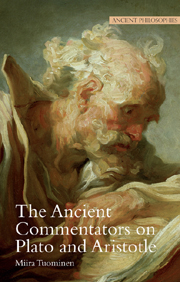5 - Psychology: perception and intellect
Summary
Background for commentators on perception
“Psychology” means a study of soul (Greek psukhē, soul, and logos, account, theory). Today we understand psychology not in terms of soul but in terms of mind. The ancient commentators do speak about soul, and part of their studies concerning soul overlap with those that we understand as belonging to psychology. Yet the notion of soul is by no means the same as the modern notion of mind. On the one hand, soul extends more widely. For example, plant life is explained by reference to soul – be it a specific kind of soul (vegetative soul), or the world-soul, that is, nature as a whole, that also regulates the life of plants. On the other hand, for some authors, in particular those influenced by Plotinus, the notion of soul is narrower than what we would classify as mind. According to Plotinus, intellect is not a functional part of our soul but, rather, it is a separate metaphysical level or hypostasis (see also Ch. 3, § “Epistēmē: proofs and principles”). However, in so far as human beings can take part in the eternal intellectual activity, the Intellect can be seen to belong to the scope of psychology, as we understand the notion. Plotinus sometimes refers to this idea by applying the notion of soul up to the Intellect (e.g. Enn. 5.3.3).
In the Plotinian scheme, the human soul is capable of ordinary conceptual reasoning (dianoein), but this is to be separated from the kind of comprehensive understanding that takes place on the level of Intellect.
- Type
- Chapter
- Information
- The Ancient Commentators of Plato and Aristotle , pp. 158 - 199Publisher: Acumen PublishingPrint publication year: 2009



